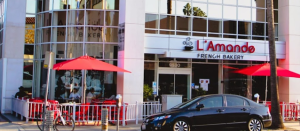Washington, D.C., usually brings to mind thoughts of the White House, Capitol Hill, and more government buildings. The hub of all things politics is also home to a growing immigrant community.
Immigrants make up 14% of the District’s population, a number which is expected to rapidly grow. This growth reflects trends in other cities both large and small — and it also speaks to the longstanding history of immigrant culture in the U.S.
Yet this history is also marred by a painful legacy of discrimination, policy arguments, and even violence. In recent years, some immigrant communities reported an increase in discriminatory behavior. Notably, these numbers grew during the Trump administration, a moment in history where anti-immigrant rhetoric was perhaps filled with more hate, false statements, and vitriol than any other time in recent memory.
Opening only a block away from the White House in 2019, one District restaurant decided to fight this narrative. Immigrant Food sought to counter pervasive stereotypes and misinformation about immigrants in the U.S. — and it opted to serve really great food while doing so.
“I wanted to create a restaurant that really celebrated and served fantastic and delicious food from some of the largest immigrant groups in the United States but also really celebrated immigration — and did so in a way that includes advocacy for immigrants and their needs,” Immigrant Food co-founder Peter Schechter said.
Co-founded with Venuezluean chef Enrique Limardo, Schechter, an Italy-born foreign policy wonk, and food enthusiast, has worked with teammates to create a restaurant that represents the diversity and ingenuity of flavors and spices from immigrant communities around the world. From Filipino rice and grains to noodle dishes inspired by Vietnam and the Caribbean, Immigrant Food has striven to be more than a restaurant. According to Chief Operating Officer Téa Ivanovic, it’s also working to be a center of necessary activism and dialogue.
“Food has forever unified people,” Ivanovic wrote to Salon Food. “For someone unfamiliar with the issues facing immigrants in America, it’s daunting to jump into the complex topic of immigration without a baseline understanding of what immigrants contribute economically, culturally, and politically to our country. But it’s a lot less tough to sit down with a group of friends and learn about how your favorite dishes or flavors have come from immigrant cultures across the globe.”









